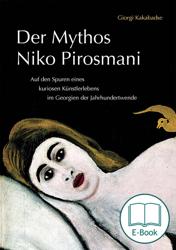Today, Niko Pirosmani (1865-1919) is considered one of the most important painters in the history of 20th century art. As a self-taught, penniless vagabond and artist in life, his work was characterised by a uniqueness that was fed exclusively by the painter's rich spiritual world. His clear, flawless and immediate perception of the world and a childlike honesty broke academic boundaries and inspired the avant-gardists of his time. Fame and recognition nevertheless eluded him throughout his life.
On the basis of eyewitness accounts, newspaper articles, protocols, and, for the first time, sources that previously fell victim to communist censorship, the author sheds new light on Pirosmani's legendary life and finds answers to previously unsolved questions. He creates a fascinating and also contradictory portrait, which he embeds in the wide range of cosmopolitan social life in Georgia's capital Tbilisi at the turn of the century. We meet more or less famous personalities of the time, writers, poets, painters, politicians, shopkeepers, owners of taverns and pubs, and many more
Today, Niko Pirosmani (1865-1919) is considered one of the most important painters in the history of 20th century art. As a self-taught, penniless vagabond and artist in life, his work was characterised by a uniqueness that was fed exclusively by the painter's rich spiritual world. His clear, flawless and immediate perception of the world and a childlike honesty broke academic boundaries and inspired the avant-gardists of his time. Fame and recognition nevertheless eluded him throughout his life, which was marked by hunger, the dire consequences of his drinking habit, homelessness and abject poverty. Unhappiness in love, exclusion from society, ridicule and scorn, finally a filthy basement and a dark, lonely death: this misfortune is contrasted by a bright, strong and pious spirit, a proud heart and the sublimity of unbridled, nature-loving freedom, which make this life appear to be a special and lively one despite all the opposition and external failure.
On the basis of eyewitness accounts, newspaper articles, protocols, and, for the first time, sources that previously fell victim to communist censorship, the author sheds new light on Pirosmani's legendary life and finds answers to previously unsolved questions. He creates a fascinating and also contradictory portrait, which he embeds in the wide range of cosmopolitan social life in Georgia's capital Tbilisi at the turn of the century. We meet more or less famous personalities of the time, writers, poets, painters, politicians, shopkeepers, owners of taverns and pubs, and many more
Heinz Fähnrich
Geboren 1941, Studium der Kaukasiologie an der Univ. Jena 1960-1965, Promotion 1969 (Jena), Habilitation 1971 (Tbilisi). Tätigkeit an der Friedrich-Schiller-Univ. in Jena (Professur für Kaukasiologie). Seit 2006 im Ruhestand. Forschungsgebiete: Historisch-vergleichende Sprachwissenschaft und Kaukasiologie.
Giorgi Kakabadze geboren 1963 in Tbilisi/Georgien.
Studium der Philologie an der Stattatlichen Iwane Jawachischwili Universität in Tbilisi.
Im Anschluss Redakteur beim Georgischen Radio, später auch als Drehbuchautor und Journalist tätig.
1992-1993 Berichterstatter in den Kriesenregionen
Giorgi Kakabadze ist aktuell im Verlag Pegasi / Tbilisi beschäftigt und dort im Bereich Literaturforschung für die Neuerscheinungen verantwortlich
Literarische Tätigkeit/Bücher:
2007 „Wie verstehe ich Literatur“, (auf der Shortlist für den Nationalen Literaturpreis „Saba“)
2010 „Niko Pirosmani- auf der Suche nach der verlorenen Simplizität“ (dokumentarischer Roman), (auf den Shortlists für zwei Literaturauszeichnungen „Gala“ und „Saba“)
2020 „Was ich sagen will“ (auf der Shortlist für den Literaturpreis „Saba“ 2021)
In Vorbereitung: Reseführer der Georgischen Literaturgeschichte


 Sample
Sample